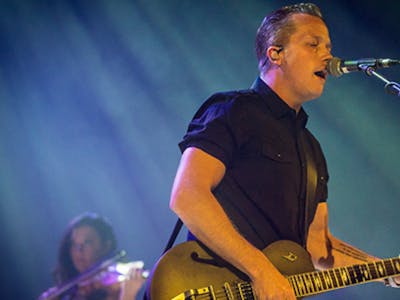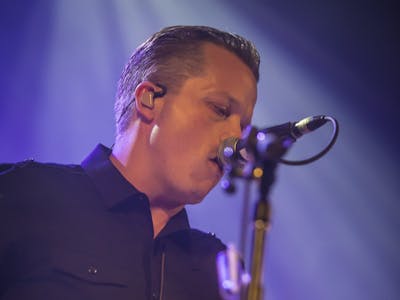Frank Turner is aware of the passage of time, of the influence of days that drag and months that gallop can exert on what he would probably never dream of calling his body of work. After all, it has been a number of years now since the hardcore troubadour transformed himself from The Boy Who Surely Could Not, to The Man That Did; it has been years now that his name has appeared in the largest type on ticket stubs that permit entry to such venues as Wembley Arena, or the Royal Albert Hall; just as it has been years since the sound of his voice projecting itself from a digital radio was anything like a surprise, let alone a novelty.
Naturally, such upward mobility provides reasons to be cheerful, and in ways that it would be lazy to term predictable. But at the same time, the mindful songwriter will take heed: for in order to gain a foothold one can subconsciously lose an edge.
So when the time came, in the latter months of 2014, to record a new studio album, Frank took stock of his latest batch of constantly-evolving, keenly-observed vignettes and wondered, ‘What now?’
“This is my sixth album, which isn’t an inherently exciting album number, in and of itself,” he says. “Lately I’ve been thinking a lot about debut albums. When a band makes a debut record, they essentially roll into the studio and play through their extant live set. There’s freshness, an excitement to it that bands often lose as time goes by. I wanted to try and make a record that had that young, exciting feel, full of piss and vinegar. This also tied in with the fact that to date I don’t feel like I’ve made an album that captures the live experience of seeing me and the Sleeping Souls do what we do best. So I had it in my head to make a record quickly, having worked on the songs for a long time beforehand in a live setting.”
This Frank Turner and the Sleeping Souls – that most supple, dexterous and punishing of permanent backing bands – did, putting in hard hours as the nights drew in over a practice compound in the Oxfordshire countryside. As always, the trick lay in translating the album as it existed in Frank’s head to the point where others in his organisation were happy to lend their shoulder to its cause. The key to this exercise lay with producer Butch Walker. A noted singer-songwriter in his own right, as a technician Walker’s name appears on the production credits of albums by artists as diverse as Katy Perry, Hot Hot Heat, Pink and Fall Out Boy. But it was the American’s organic quality that caught the Englishman’s ear, his capacity to transport songs forged amid the thunder of the practice room floor to the exacting standards of the studio without compromise or equivocation.
Butch Walker understood this as if by instinct. As with producer Nick Lowe who in the 1970s would say to Elvis Costello, ‘This song has got four chords, what’s the fucking problem?’ the producer recognised that what was required was to let the musicians Trust Their Stuff, and for Walker to stand by ready to capture lightning in a bottle.
This the two parties did.
“The ‘Souls and I flew to Nashville in December with a suite of very well-rehearsed and road-tested songs, and smashed out the album in nine days,” says Turner. “Pretty much all of it is live, and I’m proud to say that with one exception every vocal take on the record is unedited as well.
“The end result is everything I wanted it to be.”
If Frank Turner & The Sleeping Soul’s fifth album, Tape Deck Heart, released in 2013, was a catharsis of licked-wounds, not to mention the sting of raw and recent personal failure, then Positive Songs For Negative People is the sound of a man putting his show back on the road. As early as the album’s second song, Get Better, Frank is fashioning a modus operandi for one whose flaws are not things of which he is necessarily ashamed.
“I’ve got no new tricks,” he sings, “and I’m up on bricks, but, me, I’m a machine and I was built to last.”
Here, the author is only partially correct – on album number six, Frank Turner <<does>> have new tricks. Positive Songs For Negative People may resonate with the clarity and purpose of a debut album, but the songs contained within are not the sound of a man attending his first ever rodeo.
Bookended by two acoustic tracks, Positive Songs… begins with The Angel Islington, a love letter to North London that suggests that even a man with more stamps on his passport than Alan Whicker still needs a neighbourhood – in this case, the artery that runs from Archway to the southernmost tip of Upper Street - he can call his own, and friends in this neighbourhood who primarily are interested not in what he does for a living, but for who he is as a man.
Just as remarkable, and easily just as moving, is the album’s final track. A eulogy for a friend who took the awful decision to end his own life, Song For Josh takes as its subject a man who headed the security team at Washington DC’s famous 9:30 Club. A perfectly judged, and expertly delivered, treatise in loss, love and regret, this moving composition is rendered yet more poignant for the fact that it was recorded live at the club at which Josh once worked, and with not just friends but also members of his family on hand to bear witness. As a testament to both the power of song, and the power of friendship, it is a thing of beauty to behold.
“We were passing through DC on tour not long after Josh had passed,” recalls Frank on the decision to record the album’s closing track in such a poignant setting. “I’d written the song and played it out a few times, but by now the idea of recording the song in Washington DC had began to germinate – so we made technical preparations. I only had one shot at it – I wouldn’t have played the song twice at the show. I had slightly screwed up the trial version that we recorded at that night’s soundcheck, so when it came time to perform it in front of an audience I was somewhat nervous. But in the end the Gods – or perhaps it was Josh – were smiling, and I played it the best that I ever have.”
Elsewhere, the Sleeping Souls are on hand to buck and weave, to glide and soar, and sometimes just to smash it all to pieces. From songs that are by turns playful (Love Forty Down), wise in their contentment (Mittens), or else nothing less than matters of life and death (Demons, Out Of Breath), this is a collection that faces life’s minor key moments with major key fortitude. As if this weren’t quite enough, Frank Turner’s sixth album also features a duet with Denver’s Esmé Patterson, on the song Silent Key, with the singer from the Mile High City taking the part of Christa MacAuliffe, the primary school teacher turned astronaut who died in the Challenger space shuttle calamity of 1986.
The title Positive Songs For Negative People arrived as Frank Turner’s answer to a friend’s enquiry as to how he would best explain his music, and throughout this 12 song set the sense that he, and we, can overcome is overwhelming. In spite of – perhaps, even, <<because>> of - the many pitfalls and travails that litter this sparkling collection, the listener’s day and mood is improved by the existence of this album.
“In some ways I feel like this record is my definitive statement, a summation of the first five records,” says its creator.
Frank Turner is the author of five previous albums; they are Sleep Is For The Week, Love, Ire and Song, Poetry Of The Deed, England Keep My Bones and Tape Deck Heart. A Wessex Boy by inclination, these days his post is delivered to Holloway, North London. He intends to spend the next 18 months, and probably the rest of his life, on tour.








